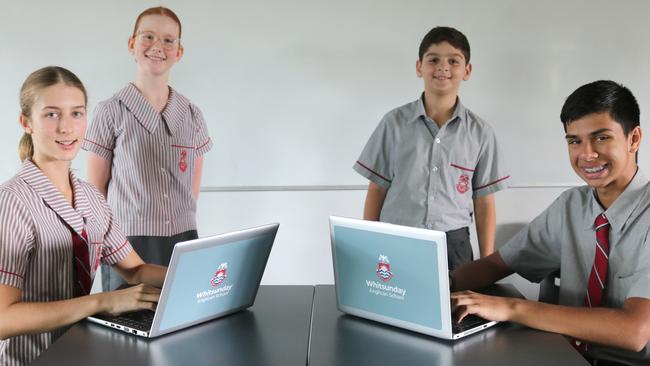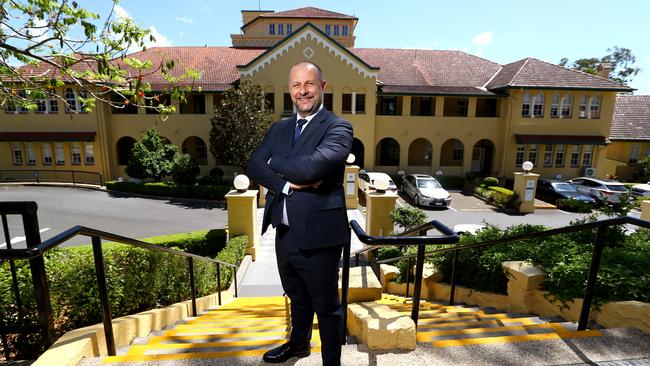NAPLAN 2018-2022: How Queensland private schools with fees over $10,000 fared
NAPLAN scores at some of Queensland’s most expensive private schools have slipped compared to five years ago, with one college dropping by 23 points. CHECK OUT YOUR SCHOOL
QLD News
Don't miss out on the headlines from QLD News. Followed categories will be added to My News.
Some of Queensland’s most expensive private schools are slipping in NAPLAN scores, with one college dropping by 23 points compared to five years ago.
A Courier-Mail analysis of more than 60 private schools, each charging annual fees of more than $10,000, has revealed the schools with the biggest NAPLAN fluctuation.
The data was compiled from 2018 NAPLAN performance for Year 9 averages across reading, writing, numeracy, spelling and grammar, and compared with the 2022 cohort.
Two bayside schools recorded the largest drop over the five years, Moreton Bay College with a 23.2 point decrease and Moreton Bay Boys College slipped by 22.2 points. The colleges charge parents $18,312 and $15,040 respectively.
Schools with the most positive NAPLAN trends included Whitsunday Anglican School, Ipswich Grammar School, John Paul College and Northside Christian College – all up by more than 20 points.
Sunshine Coast Grammar School, which charges more than $13,000, had a 13.6 point decline in its NAPLAN results.
Principal Anna Owen acknowledged the school had a slight dip, but said it remained committed to its programs.
“The balanced approach that students maintain between their academic learning and their enriching co-curricular and service involvement helps them to develop as well-rounded individuals,” Mrs Owen said.
In 2022, 9 per cent of Sunshine Coast Grammar Year 12 graduates achieved an ATAR of 99+.
Whitsunday Anglican School in Central Queensland was one of the most improved schools with a 6 per cent swing for an average of 638.2.
Principal Andrew Wheaton said the school viewed NAPLAN “holistically” and that it was not a sole indicator of performance.
“However, it is a healthy barometer of the exceptional work being done in the classroom to progress students’ literacy and numeracy,” Mr Wheaton said.

Mr Wheaton said he believed the school’s results were driven by its educators, a commitment to academic growth for all students, and evidence-based research and practice.
“We challenge and support our students to be the best they can be, where each student can attain a personal best, in a supportive environment that allows them to thrive,” he said.
Ipswich Grammar School was another high achiever which headmaster Richard Morrison said was down to a focus shift towards improving literacy and numeracy six years ago.
“As a result of this focus and good teaching practice, our boys excel in literacy and numeracy and we’re bucking the trend that has been commented on in the media so widely that boys are struggling to read and write,” Mr Morrison said.
Brisbane Boys’ College at Toowong, which charges more than $27,000, saw its NAPLAN results slip by 13.6 points between 2018 and 2022.
Headmaster Andre Casson said the College is addressing the slump.

“BBC uses multiple sources of data to support our students and evaluate our programs. NAPLAN is an important component in this suite of information,” he said.
“The academic staff at the College have already engaged with the 2022 NAPLAN results to determine how we might best adjust our approach to ensure that we continue to provide every student with the best possible educational experience.
“Success in the academic domain, while essential as part of our offerings at BBC, forms only one part of the framework that we have in place to develop the whole boy.”
Queensland Secondary Principals‘ Association president Mark Breckenridge said there were several significant events between 2018 and 2022 – mainly the Covid-19 pandemic which cancelled testing in 2020, but also the gradual transition of NAPLAN going online.
“Covid was definitely a factor across 2020 and 2021,” he said.
“There was also a mix of government, Catholic, and independent schools that were nominated to be part of the national trial of NAPLAN online. NAPLAN then went fully online this year and last year.
“But remember, NAPLAN is a point-in-time test and needs to be considered as one indicator of the progress of students and the school‘s programs, its best use is between parents and schools to see how the individual child is doing in literacy and numeracy.”
This year, NAPLAN testing took place in March – two months earlier than usual. Mr Breckenridge said 2023 results would be closely watched.
“Overall, principals were well-prepared for the earlier testing period. We will take lessons from this year and put them into play for next year and beyond, of course,” he said.
More Coverage
Originally published as NAPLAN 2018-2022: How Queensland private schools with fees over $10,000 fared




